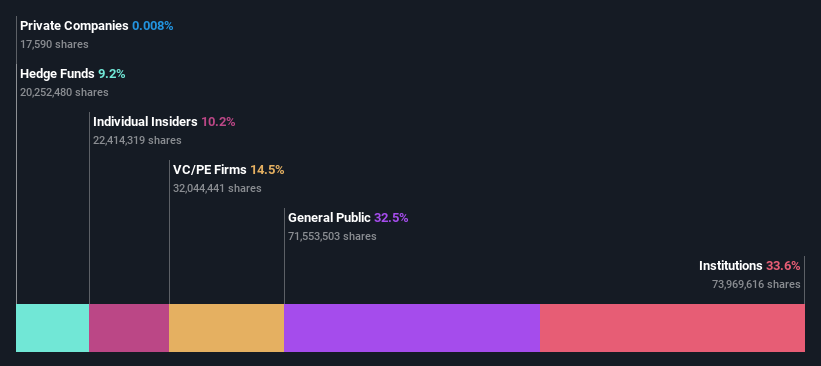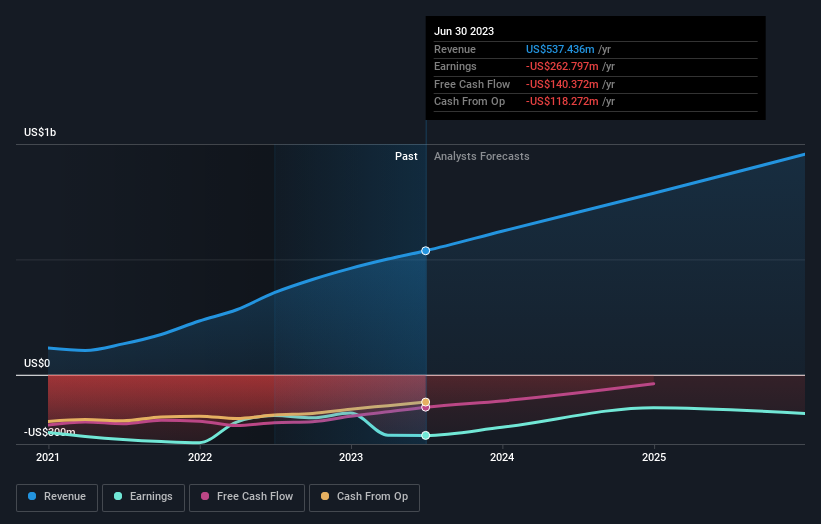Institutional investors may adopt severe steps after Sonder Holdings Inc.'s (NASDAQ:SOND) latest 12% drop adds to a year losses
Key Insights
Significantly high institutional ownership implies Sonder Holdings' stock price is sensitive to their trading actions
A total of 9 investors have a majority stake in the company with 52% ownership
If you want to know who really controls Sonder Holdings Inc. (NASDAQ:SOND), then you'll have to look at the makeup of its share registry. And the group that holds the biggest piece of the pie are institutions with 34% ownership. That is, the group stands to benefit the most if the stock rises (or lose the most if there is a downturn).
And institutional investors endured the highest losses after the company's share price fell by 12% last week. Needless to say, the recent loss which further adds to the one-year loss to shareholders of 80% might not go down well especially with this category of shareholders. Also referred to as "smart money", institutions have a lot of sway over how a stock's price moves. Hence, if weakness in Sonder Holdings' share price continues, institutional investors may feel compelled to sell the stock, which might not be ideal for individual investors.
In the chart below, we zoom in on the different ownership groups of Sonder Holdings.
Check out our latest analysis for Sonder Holdings
What Does The Institutional Ownership Tell Us About Sonder Holdings?
Institutions typically measure themselves against a benchmark when reporting to their own investors, so they often become more enthusiastic about a stock once it's included in a major index. We would expect most companies to have some institutions on the register, especially if they are growing.
Sonder Holdings already has institutions on the share registry. Indeed, they own a respectable stake in the company. This implies the analysts working for those institutions have looked at the stock and they like it. But just like anyone else, they could be wrong. If multiple institutions change their view on a stock at the same time, you could see the share price drop fast. It's therefore worth looking at Sonder Holdings' earnings history below. Of course, the future is what really matters.
It looks like hedge funds own 9.2% of Sonder Holdings shares. That worth noting, since hedge funds are often quite active investors, who may try to influence management. Many want to see value creation (and a higher share price) in the short term or medium term. Our data shows that Atreides Management, LP is the largest shareholder with 9.2% of shares outstanding. The second and third largest shareholders are WestCap Investment Partners, LLC and Alec Gores, with an equal amount of shares to their name at 7.9%. Furthermore, CEO Francis Davidson is the owner of 1.8% of the company's shares.
We also observed that the top 9 shareholders account for more than half of the share register, with a few smaller shareholders to balance the interests of the larger ones to a certain extent.
Researching institutional ownership is a good way to gauge and filter a stock's expected performance. The same can be achieved by studying analyst sentiments. There are a reasonable number of analysts covering the stock, so it might be useful to find out their aggregate view on the future.
Insider Ownership Of Sonder Holdings
While the precise definition of an insider can be subjective, almost everyone considers board members to be insiders. Management ultimately answers to the board. However, it is not uncommon for managers to be executive board members, especially if they are a founder or the CEO.
I generally consider insider ownership to be a good thing. However, on some occasions it makes it more difficult for other shareholders to hold the board accountable for decisions.
It seems insiders own a significant proportion of Sonder Holdings Inc.. Insiders have a US$11m stake in this US$106m business. We would say this shows alignment with shareholders, but it is worth noting that the company is still quite small; some insiders may have founded the business. You can click here to see if those insiders have been buying or selling.
General Public Ownership
With a 32% ownership, the general public, mostly comprising of individual investors, have some degree of sway over Sonder Holdings. This size of ownership, while considerable, may not be enough to change company policy if the decision is not in sync with other large shareholders.
Private Equity Ownership
With a stake of 15%, private equity firms could influence the Sonder Holdings board. Sometimes we see private equity stick around for the long term, but generally speaking they have a shorter investment horizon and -- as the name suggests -- don't invest in public companies much. After some time they may look to sell and redeploy capital elsewhere.
Next Steps:
It's always worth thinking about the different groups who own shares in a company. But to understand Sonder Holdings better, we need to consider many other factors. For example, we've discovered 4 warning signs for Sonder Holdings (2 are a bit concerning!) that you should be aware of before investing here.
If you are like me, you may want to think about whether this company will grow or shrink. Luckily, you can check this free report showing analyst forecasts for its future.
NB: Figures in this article are calculated using data from the last twelve months, which refer to the 12-month period ending on the last date of the month the financial statement is dated. This may not be consistent with full year annual report figures.
Have feedback on this article? Concerned about the content? Get in touch with us directly. Alternatively, email editorial-team (at) simplywallst.com.
This article by Simply Wall St is general in nature. We provide commentary based on historical data and analyst forecasts only using an unbiased methodology and our articles are not intended to be financial advice. It does not constitute a recommendation to buy or sell any stock, and does not take account of your objectives, or your financial situation. We aim to bring you long-term focused analysis driven by fundamental data. Note that our analysis may not factor in the latest price-sensitive company announcements or qualitative material. Simply Wall St has no position in any stocks mentioned.


